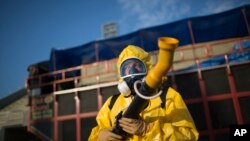The World Health Organization says large gatherings, such as at this summer's Olympic Games in Brazil, do not mean a greater risk of Zika virus transmission.
WHO's Emergency Committee on the Zika virus met Tuesday to consider the possible risks to mass gatherings in countries and cities with a Zika outbreak, including Rio de Janeiro.
The committee said "individual risks in areas of transmission are the same whether or not a mass gathering is conducted, and can be minimized by good public health measures."
The U.N. agency says there is only a "very low risk" that the Olympic Games in August and the Paralympic Games in September might result in spreading Zika internationally.
The games are taking place during winter in Brazil, when the spread of such viruses is minimal. WHO also noted that Brazilian authorities are stepping up their mosquito-control measures.
The Zika committee reaffirmed previous recommendations that pregnant women should not travel to areas with a virus outbreak, and that while they are pregnant they should either abstain from sex or practice only safe sex with partners who do travel to Zika-infected areas.
More than 100 doctors called on the WHO last month to either postpone the Summer Games or move them to a different venue.
Zika is responsible for microcephaly, a severe birth defect in which babies are born with abnormally small heads and possible developmental problems. It is spread by mosquitoes, and Brazil has been at the heart of Latin America's Zika outbreak.




